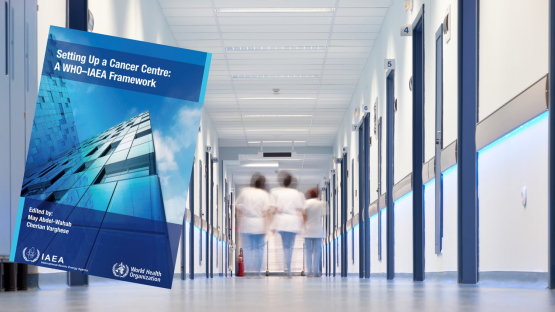With the number of cancer deaths worldwide forecast to rise by 60 percent in the next two decades, to 16 million people every year, a comprehensive approach to cancer control becomes ever more important, especially in low- and middle-income countries – in Africa and elsewhere. Sustainable cancer centres are essential in achieving this goal.
The World Health Organization (WHO) and the IAEA have recently published a guide on Setting up a Cancer Centre, offering a practical framework to develop a centre or strengthen the provision of services in an existing one. The guide also covers multidisciplinary cancer care, details the infrastructure, human resources and equipment required for oncological and supportive care services.
To look deeper into the proposed framework and discuss the ideas presented in the publication, the IAEA and WHO will host a webinar on 23 March 2022, open to the public. During the first panel, experts will explain how the framework can help IAEA and WHO initiatives on cancer.
“The IAEA provides a holistic approach to the prevention, diagnosis and treatment of cancer,” said May Abdel-Wahab, Director of the IAEA’s Division of Human Health. “Our global initiatives are aimed at assisting countries in introducing and improving radiation medicine capacities and in building the cancer care workforce. We want to ensure efficiency and sustainability in everything we do, and the guidance offered in our publication will enable us to achieve more by integrating it within many of our projects.”
One recent initiative is the Rays of Hope, launched last month by IAEA Director General Rafael Mariano Grossi in Addis Ababa, Ethiopia, which includes support to innovation and regional anchor centres.
The second panel of the webinar, focusing on specific parts of the guide, will feature international experts in cancer control who will discuss how such cancer centres can offer comprehensive services in screening, diagnosis, multidisciplinary treatment, palliative care, and support capacity building.
“We want to facilitate opinion exchange between leading experts, and this webinar will serve as a platform for fruitful discussions through the framework,” said Bente Mikkelsen, Director of the Department of Noncommunicable Diseases at the WHO.
The published guide can help physicians, policy makers and programme managers develop cancer treatment facilities in a phased manner. As many countries are developing or expanding such facilities, the webinar sessions provide insights into the critical issues and factors to be considered in planning and/or expanding cancer treatment services.
Why are Cancer Centres essential?
A cancer centre is a significant element in providing services and leadership in cancer care. Serving as a guiding institution for all aspects of cancer control and being instrumental in operationalizing, they help achieve the goals of countries. They are also essential for capacity building, teaching and provision of technical support for a government and its partners.
In some cases, centres have broad scientific agenda, and their benefits go far beyond clinical care. They contribute to strengthening health systems by targeting cross-cutting, system-related issues. They are flagships for quality care and contribute to global cancer care by engaging in relevant research and leveraging existing networks.




